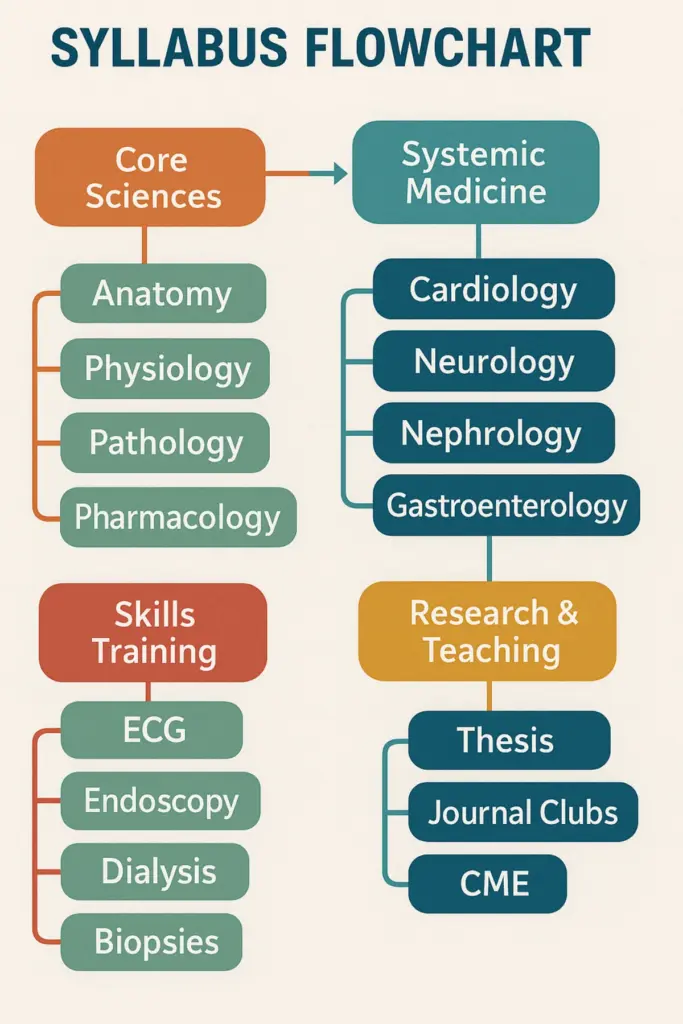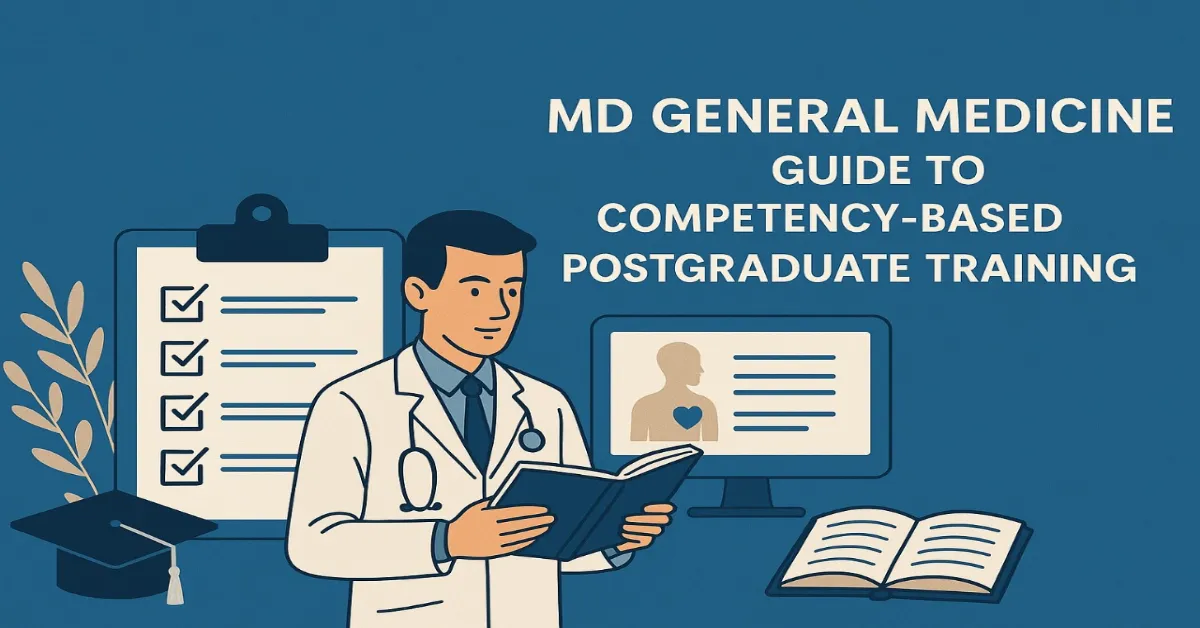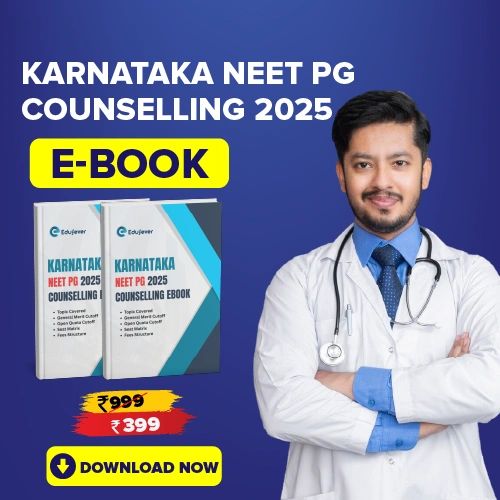MD General Medicine: Pursuing an MD General Medicine is one of the most prestigious and challenging paths for medical graduates in India. The program is designed to produce highly skilled physicians who can manage complex health conditions, provide advanced patient care, contribute to medical research, and teach future healthcare professionals.
Unlike traditional models, the competency-based curriculum focuses on practical skills, patient safety, clinical decision-making, and continuous learning. This ensures that postgraduates emerge as confident specialists, capable of handling both common and critical medical conditions with scientific precision and compassion.
What is MD in General Medicine?
MD General Medicine is a 3-year postgraduate medical course designed to train doctors in diagnosing, treating, and preventing adult health problems. The program emphasises clinical decision-making, patient management, research, and teaching skills.
MD General Medicine Eligibility Criteria
To get admission into MD General Medicine, candidates must meet the following eligibility requirements:
- Completed an MBBS degree from a recognised medical college.
- Registered with the National Medical Commission (NMC) or State Medical Council.
- Completed a one-year compulsory internship.
- Qualified NEET-PG entrance exam with the required cutoff score.
MD General Medicine Course Duration
The course duration of MD in General Medicine is 3 years. During this period, students undergo:
- Year 1: Orientation, OPD & ward duties, supervised procedures, Basic Life Support (BLS) training.
- Year 2: Emergency management, independent duties, thesis writing, UG teaching.
- Year 3: Advanced critical care training, ICU & casualty calls, thesis submission, and final exams.
Objectives of the MD General Medicine Program
The primary goal of this program is to train doctors who can:
- Diagnose and manage a wide range of health conditions using evidence-based practices.
- Deliver Basic Life Support (BLS) and Advanced Cardiac Life Support (ACLS) in emergencies.
- Provide preventive, rehabilitative, and holistic healthcare.
- Demonstrate empathy, ethical responsibility, and professionalism in patient care.
- Engage in medical research, clinical audits, and contribute to academic publications.
- Play an active role in National Health Programs such as tuberculosis control, immunization drives, and preventive health strategies.

Core Competencies in MD General Medicine
Cognitive Domain (Knowledge)
| Category | Subjects / Areas Covered |
|---|---|
| Basic Sciences | Anatomy, Physiology, Pathology, Pharmacology, Microbiology, Genetics, Immunology |
| Systemic Medicine | Cardiology, Pulmonology, Nephrology, Gastroenterology, Hepatology, Endocrinology, Neurology, Dermatology, Rheumatology, Infectious Diseases, Oncology, Geriatrics, Psychiatry |
| Research & Epidemiology | Knowledge of biostatistics, clinical trials, and public health strategies. |
Affective Domain (Attitude)
- Develop teamwork and leadership skills.
- Maintain ethical standards, respect patient rights, and communicate effectively with patients and families.
- Cultivate a lifelong learning attitude through CME (Continuing Medical Education).
Psychomotor Domain (Skills)
Hands-on training includes:
| Category | Skills / Procedures |
|---|---|
| Clinical Procedures | IV Cannulation, Lumbar Puncture, Bone Marrow Biopsy, Pleural Tap, Pericardiocentesis, Dialysis, Endoscopy, Liver Biopsy |
| Emergency Care | Intubation, CPR, Defibrillation, Ventilator Management |
| Diagnostic Abilities | ECG, Echocardiography, Ultrasound, CT Scan, MRI, Pulmonary Function Tests |
| Communication Skills | Breaking Bad News, Genetic Counselling, Informed Consent, Discharge Summaries |
Teaching and Learning Methods
The MD General Medicine program emphasises interactive and practical learning over passive lectures. Key methods include:
| NEET PG Counselling Guide 2025 | |
|---|---|
| MCC NEET PG Counselling Guide eBook 2025 | 📥 Download |
| DNB Counselling Book 2025 | 📥 Download |
- Bedside teaching, grand rounds, and clinical demonstrations.
- Case discussions and interdisciplinary meetings.
- Journal clubs, seminars, symposia, and CMEs.
- Research presentations and publication requirements.
- Skill-based learning in simulation labs before independent practice.
Assessment and Examinations
Formative Assessment
- Conducted quarterly to evaluate knowledge, patient care, procedural skills, research progress, and communication abilities.
- Includes feedback-based appraisal to ensure continuous improvement.
Summative Assessment
- Thesis Submission: A mandatory original research project.
- Theory Exams (Four Papers):
- Paper I: Basic Medical Sciences
- Paper II: Medicine & Allied Specialties (Pediatrics, Dermatology, Psychiatry)
- Paper III: Tropical & Infectious Diseases
- Paper IV: Recent Advances in Medicine
- Practical/Clinical Exam: Case presentations, procedural stations, and viva voce.
A minimum of 50% in both theory and practicals is required to qualify.
Career Prospects After an MD in General Medicine
Graduates of MD General Medicine can pursue careers as:
- Consultant Physicians in hospitals and private practice.
- Super-specialists by pursuing DM in cardiology, nephrology, gastroenterology, neurology, endocrinology, etc.
- Medical Researchers contributing to clinical advancements.
- Medical Educators training future doctors.
- Public Health Experts supporting national and global health programs.
With rising lifestyle diseases, pandemics, and demand for multi-disciplinary specialists, MD General Medicine remains a highly rewarding career path in India and abroad.

